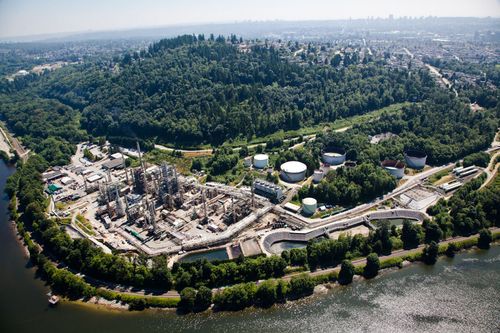Parkland’s Burnaby Refinery produces Canada’s first SAF

SOURCE: Parkland
December 18, 2024
BY Parkland Corp.
Parkland announced it has successfully produced Canada’s first batch of low carbon aviation fuel (SAF) at its Burnaby Refinery. With support from the Government of British Columbia, this is a major step toward delivering a Canadian-made solution that can help lower aviation sector emissions, foster economic growth, and support the low-carbon ambitions of British Columbia and Canada.
“Parkland is thrilled to demonstrate its leadership and proven expertise at the Burnaby Refinery by becoming the first Company to produce low carbon aviation fuel in Canada,” said Ferio Pugliese, senior vice president at Parkland. “Thanks to the vision and skill of our team, the leadership of the Government of British Columbia and Air Canada, Canadians can see the possibility of flying with Canadian-made low carbon fuel. This pilot project demonstrates how constructive incentives can spur Canadian production of low carbon aviation fuel.”
Advertisement
Using existing infrastructure, Parkland’s Burnaby Refinery has successfully produced approximately 101,000 liters of low carbon aviation fuel by using non-food grade canola and tallow as core feedstocks. With appropriate certification across the full supply chain, low carbon aviation fuel (LCAF) could be classified as sustainable aviation fuel (SAF). This batch of fuel has been purchased by Air Canada.
"I want to congratulate Parkland on this groundbreaking initiative that aligns with our government's climate goals and the urgency in which we must address climate change," said Adrian Dix, Minister of Energy and Climate Solutions. "British Columbia leads the way in incentivizing innovation to reduce emissions across many sectors, and Parkland continues to be an outstanding partner and role model for biofuel producers."
Advertisement
“This represents our first commercial purchase of Canadian produced low carbon aviation fuel,” said Michael Rousseau, president, and CEO at Air Canada. “Currently, the Canadian airline industry is dependent on international imports of low carbon fuels, making Parkland’s accomplishment a critical first step in creating domestic supply. Air Canada is actively pursuing efforts to mitigate its greenhouse gas emissions and LCAF and SAF are a critical component of our multifaceted approach to reducing our impact on the environment and promoting environmental sustainability in our operations. We encourage all levels of government to support the development of a competitive low carbon aviation fuel or SAF industry and production market in Canada with balanced, supporting policies.”
Low carbon aviation fuel has lower lifecycle greenhouse gas emissions than conventional jet fuel and can be used in existing aircraft without modification. Parkland’s Burnaby Refinery is the first company to produce this fuel in Canada. Through incentives and ongoing government support, this fuel can play an essential role in supporting Canada’s 2050 net-zero targets.
Related Stories
NREL announced the findings of the Assessment of BQ-9000 Biodiesel Properties for 2024, the eighth in a series of annual reports documenting the quality of biodiesel from U.S. and Canadian producers participating in the BQ-9000 program.
Kintetsu World Express Inc. has entered into a new agreement with Shell Aviation regarding the use of SAF. Under this agreement, KWE will adopt Shell Aviation's digital platform "Avelia" to swiftly address shippers' low-carbon transportation needs.
The U.S. EIA increased its forecast for 2026 renewable diesel production in its latest Short-Term Energy Outlook, released Aug. 12. The 2026 forecast for SAF production was lowered, but the outlook for biodiesel production was maintained.
Aemetis Inc. released Q2 results, reporting increase revenue when compared to Q1. During an earnings call, company officials detailed progress with the company’s RNG, ethanol, biodiesel, SAF and carbon CCS projects.
Calumet Inc. on Aug. 8 confirmed its Montana Renewables biorefinery is currently running at full capacity. An initial phase of the company’s MaxSAF initiative remains on track to boost SAF capacity to up to 150 MMgy by mid-2026.
Upcoming Events










